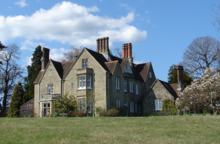This article includes a list of general references, but it lacks sufficient corresponding inline citations. (August 2022) |
| Cittaviveka Buddhist Monastery | |
|---|---|
 The main building at Chithurst Buddhist monastery | |
| Religion | |
| Affiliation | Thai Forest Tradition |
| Location | |
| Location | Cittaviveka
Chithurst Buddhist Monastery Chithurst (W. Sussex), Petersfield, Hampshire GU31 5EU |
| Country | United Kingdom |
| Architecture | |
| Founder | Venerable Ajahn Sumedho Mahathera |
| Date established | 1979 |
| Website | |
| cittaviveka.org | |
| Part of a series on |
| Buddhism |
|---|
 |
Cittaviveka (Pali: 'discerning mind'), commonly known as Chithurst Buddhist Monastery, is an English Theravada Buddhist Monastery in the Thai Forest Tradition. It is situated in West Sussex, England in the hamlet of Chithurst between Midhurst and Petersfield. It was established in 1979 in accordance with the aims of the English Sangha Trust, a charity founded in 1956 to support the ordination and training of Buddhist monks (bhikkhus) in the West. The current abbot, since 2019, is Ajahn Ahimsako.
The monastery was established by Ajahn Sumedho under the auspices of his teacher, Ajahn Chah of Wat Pah Pong, Ubon, Thailand. Ajahn Chah visited the monastery at its inception as the first branch monastery of Wat Pah Pong to be established outside of Thailand. Although the style of the monastery has been modified to accommodate Western social and cultural mores, it retains close links with Thailand especially monasteries of the Thai Forest Tradition and is supported by an international community of Asians and Westerners.[1][2]
"Cittaviveka" is a term used in the Pāli scriptures of Theravada Buddhism. The monastery was so named by Ajahn Sumedho, the first abbot (1979–1984) as a suitable word-play on "Chithurst," the hamlet in which its main house is situated. The title "Chithurst Buddhist Monastery" is also commonly used, although the approximately 175 acres/70 hectares of the monastery’s land extend into the adjacent parish.
Subsequent abbots have been Ajahn Ānando (1984–1992), Ajahn Sucitto (1992–2014), Ajahn Karuniko (2014–2019) and Ajahn Ahimsako (2019–present, see https://www.cittaviveka.org/guiding-elders for biography). The monastery is supported by donations, and lay people may visit or stay for a period of time as guests free of charge. Teachings are given on a regular basis, generally on weekends.[3]
- ^ Much of the information for this article, along with samples of Ajahn Sumedho’s teachings, can be found in the book, "Cittaviveka: teachings from the silent mind". This book and others can be obtained on the Forest Sangha website www.forestsangha.org under ‘Publications
- ^ Ajahn Chah’s Forest Monasteries can visited via www.forestsangha.org
- ^ See the monastery’s website www.cittaviveka.org for details.